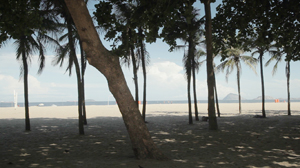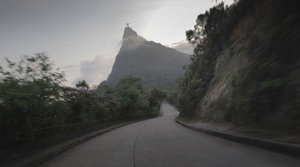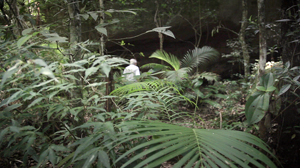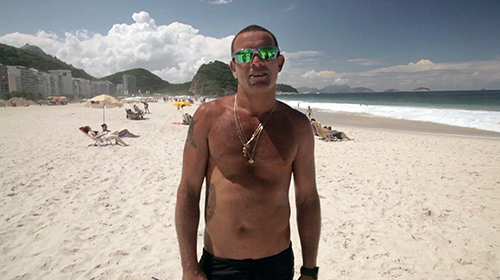ANTONIO, LINDO ANTONIO
Documentaire de création
Portugal / Brésil
42 MIN | HD | SON 5.1 | COULEUR
© Ana Maria Gomes & Le G.R.E.C
Production LE G.R.E.C (Groupe de recherche et d'essai cinématographique)
Avec la particiation du CNC et le soutien de La SCAM (Société civile des Auteurs Multimédias)
Antonio, l’oncle de la réalisatrice, a quitté le Portugal il y a 50 ans pour s’installer au Brésil – il avait alors 19 ans. Au fil des années, il a promis à sa mère qu’il reviendrait… mais un demi-siècle plus tard elle l’attend toujours. Pourquoi Antonio ne revient-il pas ? "S’il ne trouve plus le chemin, il n’a qu’a se prendre un GPS ! " s’indigne son frère Leandro. Entre la maison rurale où l’oncle est né au Portugal et la mégalopole de Rio où il vit exilé de sa famille, il y a un océan d’incompréhension et de non-dits.
L’absent déploie les imaginaires et génère de la fiction…
ANTONIO, DASHING ANTONIO
Documentary
Portugal / Brazil
42 MIN | HD | SOUND 5.1 | COLOR
© Ana Maria Gomes & Le G.R.E.C
Production LE G.R.E.C (Groupe de recherche et d'essai cinématographique)
With the participation of the CNC and the support of La SCAM
Antonio, Dashing Antonio is a film about the director’s uncle who left Portugal for Brazil 50 years ago, at the age of 19 – never to return. Over the years, he has promised his mother that he would come back… but half a century later, she is still waiting.
Why did he never return? "He may believe that life lasts a lifetime, but no," says his brother Bento, indignant. His 90-year-old mother has grown bitter and resigned: "If he doesn't give a damn about me, likewise!" Between the Portuguese hamlet where the uncle was born and grew up, and the megalopolis of Rio where he lives in a self-imposed exile, there is a world of misunderstanding and things that go unsaid.
ANTONIO, LINDO ANTONIO
Documentário
Portugal / Brasil
42 MIN | HD | SOM 5.1 | COR
© Ana Maria Gomes & Le G.R.E.C
Produção LE G.R.E.C (Groupe de recherche et d'essai cinématographique)
Com a participação do CNC e da SCAM
António, lindo António é um documentário que procura saber as razões pelas quais o tio da realizadora, que partiu há 50 anos para o Brasil, nunca mais voltou à sua aldeia, para indignação da sua mãe e dos irmãos: “A casa não saiu do sítio, só tem que pegar num GPS se já não encontrar o caminho.” Entre um Portugal tradicional e o Rio de Janeiro onde se instalou o tio António, um oceano de incompreensões e de omissões
-







Julien Farenc
BPI - BIBLIOTHEQUE PUBLIQUE D'INFORMATION
Membre de la commission de sélection d'images en bibliothèques (2017)
Page du film
-
Nous découvrons une maison perdue dans la montagne et la brume où sa grand-mère vit dans un dénuement presque total. La pseudo-enquête familiale qui s’engage alors, tourne rapidement court. Chacun se contredit et pourtant tous, racontent encore et encore, la même histoire : la légende du mauvais fils égoïste, dont on ne veut même plus prononcer le nom. Car le bel António (o lindo António en Portugais) cristallise toutes les rancoeurs et les regrets, que personne n’ose vraiment formuler. Ana Maria Gomes suggère malicieusement avec son titre, des points communs entre António et le personnage principal joué par Marcello Mastroianni dans le film de Mauro Bolognini, Il Bell’Antonio. Comme lui, il n’arrive pas être un homme - c’est-à-dire à devenir père, comme lui il plaît aux femmes (dixit sa mère), comme lui il pourrait être impuissant et même homosexuel, un stéréotype adressé aux Brésiliens en général (et pas seulement depuis le Portugal). L’enquête reprend quand la plasticienne (diplômée des arts décoratifs et du Fresnoy) traverse l’Atlantique. Elle joue un instant du fort contraste climatique (le soleil) et culturel (la plage, la musique) pour finalement approcher António en catimini. A-t-il fuit le service militaire comme beaucoup d’autres Portugais à l’époque fuyant les guerres de décolonisation ? A-t-il trouvé à Rio gloire et fortune ? A-t-il vraiment coupé tous les ponts et va-t-il un jour rendre visite à “ceux qui sont restés” ? Le réel est souvent moins facétieux que les petites f(r)ictions et mésententes familiales.
-
We discover a house lost in the mountains and mist where her grandmother lives in near total destitution. The so-called family investigation that begins quickly runs out of steam. Everyone contradicts one another, yet all of them keep repeating the same story over and over: the legend of the selfish, ‘bad son,’ whose name no one dares to speak anymore. For the handsome António (o lindo António in Portuguese) crystallizes all the resentment and regret that no one fully dares to express. With her title, Ana Maria Gomes playfully hints at the similarities between António and the main character played by Marcello Mastroianni in Mauro Bolognini’s film Il Bell’Antonio. Like him, António cannot seem to become a man—that is, to become a father. Like him, he charms the women (according to his mother); like him, he might be impotent and even homosexual—a stereotype often directed at Brazilians in general (not just from Portugal).
The investigation picks up again when the artist (a graduate in decorative arts and Fresnoy) crosses the Atlantic. She briefly plays with the stark contrast in climate (the sun) and culture (the beach, the music) before finally approaching António discreetly. Did he flee military service, like many other Portuguese men of the time, escaping the colonial wars? Did he find fame and fortune in Rio? Has he really cut all ties, and will he one day visit ‘those who stayed behind’? Reality often proves less mischievous than the small family f(r)ictions and misunderstandings.












